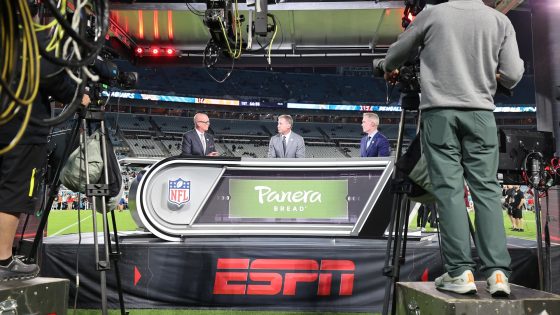Millions of DirecTV customers missed the NFL’s opening “Monday Night Football” game on ESPN as the company has yet to reach a deal with network parent Disney.
Disney’s TV networks went dark on Sept. 1 for DirecTV’s customers amid a carriage battle over fees and bundling. Those networks include pay-TV channels ESPN and FX, as well as broadcast network ABC in some markets.
Disney and DirecTV did not reach a deal in time for “Monday Night Football,” a 32-19 San Francisco 49ers victory over the New York Jets. However, negotiations are still ongoing and a deal could come as early as this week, people familiar with the matter said.
On Tuesday, Disney said it wanted to open a three-hour window of ABC News coverage to allow DirecTV customers in markets that are unable to access ABC to watch Tuesday night’s presidential debate. But DirecTV rejected that plan, saying consumers had other options and that a temporary return of channels would “cause customer confusion.”
Disney added that it is still at the negotiating table with DirecTV.
The satellite and streaming company called Disney anti-consumer as DirecTV is pushing for an option in which it could create genre-specific bundles, such as kids, entertainment and news, which Disney opposes.
As a result of the fight, DirecTV customers were unable to see the U.S. Open and the first full weekend of the college football season.
Live sports continue to attract big audiences and, in turn, high media rights deals, which in turn have created some of the most expensive networks on TV. ESPN is said to reap some of the highest fees paid by pay-TV companies to carry the network and its sister channels, CNBC previously reported.
Meanwhile, sports have long been considered the glue holding the traditional pay-TV bundle together as customers flee for streaming services. There have been 4 million pay-TV customer losses this year to date, according to a recent MoffettNathanson report.
DirecTV’s carriage fight comes as its latest ad campaign has highlighted its streaming options to woo consumers.
“The Walt Disney Co. is once again refusing any accountability to consumers, distribution partners, and now the American judicial system,” said Rob Thun, DirecTV’s chief content officer, in a release last week.
Last month, a U.S. judge temporarily blocked sports streaming service Venu â a joint venture between Disney, Fox Corp. and Warner Bros. Discovery â from launching in time for the NFL season. The lawsuit was started by internet TV bundle provider Fubo TV and supported by DirecTV and EchoStar’s Dish.
The lawsuit argued there were antitrust concerns related to Venu. The companies also argued Venu would be detrimental to their businesses as it would offer a sports-only bundle. Pay-TV distributors have argued they are losing customers at a fast clip due to high programming costs that have caused the price the bundle to soar when streaming was initially a more inexpensive option.
DirecTV alerted customers on Friday to competitor alternatives for watching ESPN and also said it would provide a $30 credit to customers.
On Saturday, DirecTV said it filed a complaint with the Federal Communications Commission, stating that Disney failed to negotiate in good faith.
DirecTV has said that Disney has “insisted that DirecTV agree to a ‘clean slate’ provision and a covenant not to sue, both of which are intended to prevent DirecTV from taking legal action regarding Disney’s anticompetitive demands, which would include filing good faith complaints at the Commission.”
Disney has said that it is “open to offering DirecTV flexibility and terms which we’ve extended to other distributors,” and added that it “will not enter into an agreement that undervalues our portfolio of television channels and programs.”
“We never want to black out. It’s not good for either side. It’s not good for the customer, of course. We did everything we could,” ESPN chairman Jimmy Pitaro said on CNBC last week.
Disney later added that more than 90% of DirecTV households watched its channels every month last year, and has the highest performing content on the platform, citing Nielsen. The company also said it has proposed a variety of packages to DirecTV and is also asking for rates that are in line with other distribution partners.
The NFL in particular is often the reason carriage disputes have been resolved. The most recent example happened only last year.
Last September, cable giant Charter Communications and Disney went through a similar battle that ultimately lasted 10 days. However, Charter and Disney reached a deal hours ahead of “Monday Night Football” that allowed customers to tune in that night.
Last year Charter had argued the pay-TV business model was broken, noting that programmers like Disney had siphoned much of their content for their streaming services. In response, Charter pushed for its customers to receive access to Disney’s ad-supported streaming apps, Disney+ and ESPN+, at no additional cost.
ESPN’s Pitaro referenced those negotiations that took place with Charter a year ago in his remarks last week.
“While we know that deal was very hard to get done ⦠I give Charter a ton of credit because they walked into the room and they had very specific ideas. They had a vision that they wanted to execute against,” Pitaro said on CNBC.
The dispute between DirecTV and Disney has led to mudslinging between the two companies reminiscent of most carriage fights.
In this case, ESPN reporter Adam Schefter called out on social media platform X the Monday matchup on ESPN between the Jets and 49ers, noting what other platforms DirecTV subscribers could sign up for to catch the game.
DirecTV also expressed its displeasure.
“Disney is in the business of creating alternate realities, but this is the real world where we believe you earn your way and must answer for your own actions,” DirecTV’s Thun said in a release. “They want to continue to chase maximum profits and dominant control at the expense of consumers â making it harder for them to select the shows and sports they want at a reasonable price.”
Source Agencies



